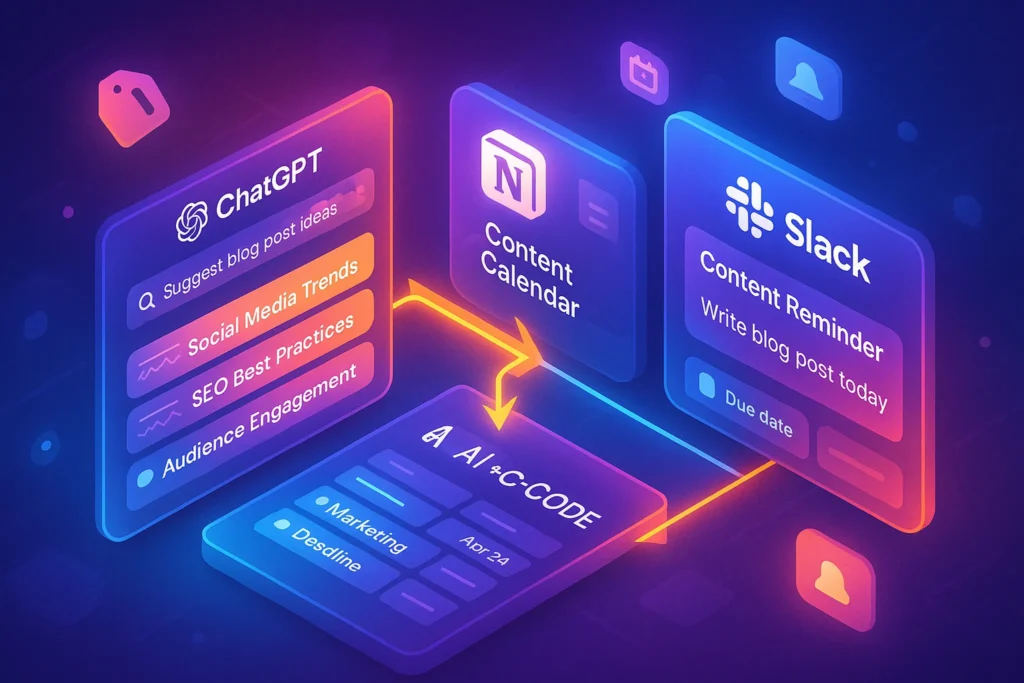-This post may contain affiliate links. If you click on one and make a purchase, I may earn a small commission at no extra cost to you.-
🧠 Introduction – Build Smarter, Not Harder
Creating consistent, valuable content is no easy feat—especially for growing sites like NerdChips. But what if your content calendar could plan itself? That’s where AI-powered automation comes in:
-
Map high-CPC keywords using ChatGPT + SEO tools
-
Cluster topics intelligently by audience intent
-
Populate your editorial calendar in platforms like Notion, Trello, or Google Sheets
-
Schedule reminders seamlessly with automation platforms
In this guide, we’ll walk step-by-step through tools and workflows that let AI do your planning—leaving you free to focus on writing and promotion.
🧩 1. Generate Seed Topics via‑Prompt in ChatGPT
Use a prompt like:
“Act as an SEO content strategist. For [audience/topic], generate 30 high-CPC keyword ideas, categorize them by funnel stage (Awareness, Consideration, Decision), and propose a blog title for each.”
This produces a structured list ready for review.
🧭 2. Validate & Score with SEO Tools
Copy the ChatGPT list into Ahrefs/Ubersuggest:
-
Filter: CPC ≥ $1.50, Volume ≥ 300, Difficulty ≤ 40
-
Discard low-value entries
-
Export final keyword list (10–20 topics)
⚙️ 3. Build Your Calendar in Notion (or Trello)
Create a database with:
-
Title
-
Keyword
-
Funnel Stage
-
Target Publish Date
-
Status & Assigned Writer
-
Tags / Notes
You can also trigger this setup programmatically using Make or Zapier DnD entries.
🔄 4. Automate Topic Import via Zapier or Make
Example Zap:
-
Trigger: New row in Google Sheets (approved topic)
-
Action 1: Create a Notion database item
-
Action 2: Add a Google Calendar event with topic title + due date
-
Action 3: Send Slack reminder to editor
Now your content ideas automatically fill the planning hub—and notify your team.
⏰ 5. Push Reminder & Accountability Triggers
Add “one week before publish” Zaps:
-
Slack or Email reminder with draft link
-
Optionally, trigger Google Meet for content alignment session
-
Optionally, post draft-insights into a dedicated Slack channel
Bonus
This system mirrors how we automated email follow-ups in How to Automate Email Follow-Ups in Gmail Using Filters, except replaced email triggers with content-stage workflows. It’s the same automation mindset—just applied to content planning.
✅ Benefits at a Glance
-
Consistency: Reduce manual calendar upkeep
-
Quality: AI-suggested topics come with search intent built in
-
Accountability: Reminders ensure deadlines don’t slip
-
Efficiency: Save hours weekly and scale publishing with ease
🔍 6. Step-by-Step Tool Deep Dive & Templates
A. ChatGPT Prompt Templates for Ideation
-
“Keyword Cluster Prompts”
-
“Content Pillar Prompts”
-
“Calendar Value Prompts”
✨ Use these prompt templates in ChatGPT or API tools to ensure repeatable quality planning.
B. Content Validation Workflow
-
SEO proprietary tools: Export keywords and CPC metrics from Ubersuggest or Ahrefs. Filter for volume ≥ 500 and CPC ≥ $1.50.
-
Prioritization: Assign priority tags in Notion—(High ROI, Evergreen, Seasonal).
-
Gap analysis: Use ChatGPT prompt:
🔄 7. Advanced Automation: Automate Topic Piping
A. Zapier Notion Integration
-
Set Up Google Sheets for approved topic intake with columns: Title, Keyword, Stage, Publish Date, Writer, Status.
-
Connect a Zap:
-
Trigger: New Row in Google Sheets
-
Action: Create Notion database item – map each field
-
Action: Generate a Google Calendar event using the Title and Publish Date
-
Action: Send DM to Slack with task: “New content idea scheduled”
-
⚙️ Better: add an “Approved” checkbox—only Zaps trigger on approval.
B. Make Automation Alternative with Data Routers
-
Use Make to process incoming JSON or API from ChatGPT, run filters, and push topics into Notion or Trello.
-
Routes tasks based on funnel stage: Awareness → Slack content channel, Decision → Email draft assignment.
🔁 8. Calendar Exceptions & Buffer Planning
-
Plan buffer time for each topic: +1 week for research, +2 days for editing, +3 days for promotion.
-
Make can dynamically adjust dates if tasks fall past deadlines.
-
Add “Buffer Planning” in Notion: automate week-by-week review reminders.
📊 9. Repurpose Workflow Built-In
Each topic’s database entry should include checkboxes for:
-
Article written
-
Video script drafted
-
Short social clips scheduled
-
Newsletter drafted
Automate status updates:
-
As article moves to “Published,” Zap updates checklist items.
-
Zap posts status summary to Slack with link to published content.
This ensures one tool drives multi-channel output—ideal for scaling content repurposing.
🧠 10. Real Case Study: NerdChips Content Workflow
-
January: AI-generated 30 Quarterly Topics in 15 minutes
-
February: Used Zaps to automate Notion signups, assigning writers, and calendar events
-
March-April: Published 24 posts; 8 videos; 6 newsletters—all synced with workflow
-
Results: +32% monthly traffic; +18% newsletter sign-ups; major time savings
Metrics tracked: Content cost per piece vs organic traffic improvements
🛠️ 11. Troubleshooting & Tips
| Problem | Fix / Workaround |
|---|---|
| Stuck Zaps or error tasks | Re-authenticate apps; debug step-by-step |
| Missing Publish Date | Use default date fallback or zap filters |
| Duplicates in calendar | Ensure filtered triggers; use unique Topic ID in Zap filters |
| Slack notifications quiet | Add conditional delays to avoid noise; summaries instead of piecemeal alerts |
| Slack+Zoom for meetings | Use Make scheduler modules to auto-generate Zoom links and calendar invites |
| Data privacy concerns | Only pass essential metadata; avoid syncing full article drafts |
Content automation breaks easily without clear handoffs. This workflow automation framework explains how to design reliable content workflows from planning to publishing.
📈 12. The Growth Loop: Optimize & Iterate
-
At month-end, export Notion records: topic tags, RWIs, publish dates, status
-
Use simple KPI calc: average days from topic to publish, publish frequency, repurpose ratio
-
Feed learnings into ChatGPT prompt:
-
Adjust automation steps to handle smarter date buffer, tighter topic categories, etc.
🔍 Tool Stack & Workflow Overview
| Step | Tool(s) | Purpose |
|---|---|---|
| 1 | ChatGPT + custom prompts | Generate topic ideas and keyword clusters |
| 2 | Ahrefs / Ubersuggest | Validate volume, CPC, and difficulty |
| 3 | Notion / Trello | Build and structure editorial calendar |
| 4 | Zapier / Make | Feed approved topics into calendar |
| 5 | Slack / Email | Receive publication reminders |
❓FAQ
-
Can AI tools choose topics entirely automatically?
-
Yes, but human review ensures relevance—your prompts + AI list only surface ideas; you filter and approve.
-
-
Is Notion the best calendar platform?
-
It’s flexible and API-friendly. Trello or Airtable work too—but Notion’s database structure supports deeper metadata and sync.
-
-
How often should I review the content calendar?
-
Weekly reviews with Slack reminders plus quarterly plan audits work best for cadence and adjustments.
-
-
Are automation tools worth the cost?
-
For publishers creating 4+ posts/month, ROI is high. Zapier’s Basic plan (~$20/mo) pays off quickly through saved hours.
-
🧠 Nerd Verdict
Pairing ChatGPT for ideation, SEO validation, and automation platforms like Zapier or Make transforms content planning into a frictionless, strategy-driven engine. It’s not just streamlined—it’s smart.
Automated content planning isn’t just efficiency—it’s strategic optimization. From ideation to repurposing tasks and reminders, the system acts like a semi-branded AI editorial assistant. You’re operating with human judgement plus machine precision at every step.
💬 Would You Bite?
Tell us: Which step will save you the most time—ideation, validation, or calendar automation?
Hit reply and let’s optimize your content workflow! 👇



